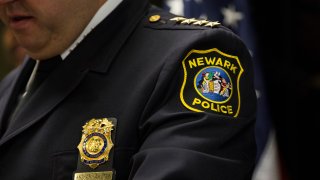
Newark, New Jersey – JANUARY 20: Newark Police Chief Anthony Campos speaks at a press conference regarding the Department of Justice’s investigation of the Newark Police Department on January 20, 2015 in Newark, New Jersey. The city government is establishing a Civilian Complaint Review Board after a Department of Justice anounced six-months ago that they would appoint a federal monitor to oversee the Newark Police Department.
New Jersey's highest court found that state law limits the powers of a citizen police oversight board in Newark, reversing in part lower court decisions in the case, which has been ongoing for years.
The 6-1 decision on Wednesday from the state Supreme Court found that municipalities in New Jersey may create police oversight boards, but that those boards may not have subpoena power and that their investigations may not happen at the same time as the police department’s own internal investigation of misconduct, NJ.com reported.
Justice Jaynee LaVecchia, who wrote the majority decision, pointed out that the state’s legislature could amend the laws to allow police oversight boards different powers.
Police oversight boards may still review, "the overall operation of the police force, including the performance of its (Internal Affairs) function in its totality or its pattern of conduct, and provide the called-for periodic reports," to officials, LaVecchia wrote.
The decision is the result of a lawsuit brought by the Fraternal Order of Police in Newark, which sued the city following the creation of the civilian police oversight board in 2016.
Newark established the board following a three-year U.S. Department of Justice investigation into the police force that uncovered systemic discrimination in pedestrian stops, excessive force and poor oversight. The city agreed to a set of reforms that are ongoing and overseen by a federal monitor.

